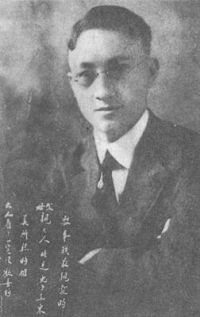Xu Zhimo
Born on January 15, 1897 in Haining, Zhejiang Province, Xu Zhimo (Chinese: 徐志摩) (1897-1931) attended Hangzhou No. 1 High School in Hangzhou. Upon his graduation in 1915, he enrolled in Shanghai University, but soon transferred to Beiyang University in Tianjin, and the following year to Beijing University.
In 1918, he went to the United States, where he studied history and banking at Clark University in Worcester, Massachusetts, and later took up political science at Columbia University in New York. He received an M. A. degree in September 1920. He then sailed to Britain for a refresher course on political economics at London University. Under the sway of Nietzschean philosophy as well as humanism and the theory of democracy, he developed a penchant for Western culture and ways of life, and, particularly, the art and literature produced by people of the Occidental world.
He began writing poetry in 1921, modeling his poetry after poets of the Aesthetic School who followed the tenet "art for art's sake." The following autumn, he returned to China and taught at Beijing, Tsinghua, and Pingmin universities. As one of the founders of the Crescent Society, he toured Europe in 1924 with Rabindranath Tagore (1861-1941), the eminent Indian poet. He wrote many excellent poems, essays, and stories after his return, and published his first collection of poems the following year under the title Poetical Works by Zhimo.
His poetry is unique for its clear and pleasing style in praise of love, ideals, and freedom, while at the same time expressing deep concern and sympathy for the poor and the sick. Also distinctive are his essays, such as "Sunrise Atop Mount Tai" and "Katherine Mansfield." He also translated Mansfield"s short stories into Chinese. "Traces of Spring" and "The Miserable" are considered among his best fictional creations.
In 1925, he traveled to the USSR, but he was critical of the October Revolution. The same year he accepted the editorship of the Beijing Morning Post's literary supplement, in which he published a number of his essays advocating modern plays and new poetry. When Poetics was set up as Beijing Morning Post's supplement, he contributed many articles on the rules and forms for new poetry in his capacity as editor-in-chief.
In 1927, he moved to Shanghai and taught at Guanghua and Daxia universities, and he also taught for some time at the Central University in Nanjing. Also in 1927, Hu Shi, Liang Shiqiu and he strarted the Crescent Book Store and a magazine named after the Store, Crescent Monthly. The latter, however, served as a forum for him to lampoon Lu Xun and the proletarian literature.
In 1928, he paid a visit to Cambridge, England, for the third time and published his most famous piece "Say Goodbye Again, Cambridge!" This poem has been widely read for its rhythmical harmony as well as its conceptual beauty.
Xu died in an aviation accident on November 19, 1931.
His main works include "Winter in the North" (1923), "The Scene of Peace" (1924), "Shayang Nara" (1924), "The Rejoice of Snow" (1924), "A Night at Feilengcui" (1925), "The Song of the Stonemason in Lushan" (1925), "Say Goodbye Again, Cambridge!" (1928), "I Don't Know from Which Direction Comes the Wind" (1928), "The Five-Old-Man Peaks" and "Chance Encouter".
References: From Xu Zhimo to Yu Guangzhong (Erya Publishing House, Taipei, 1978) A New Biography of Xu Zhimo (Lianjing Publishing Co., Taipei, 1979), A Chronicle of Xu Zhimo' Life (Shanghai Book Store, 1981) The Poet Xu Zhimo (Chonqing Publishing House, 1982) Xu Zhimo: Critical and Biographical Studies (Shaanxi People’s Publishing House, 1986) A Brief Biography of Xu Zhimo (Hunan People's Publishing House, 1986) Research on Xu Zhimo and His Works (The Chinese Culture University Press, Taiwan, 1986)
徐志摩是个天生的诗人。生时与众不同,死时轰轰烈烈。有一副悼念志摩的挽联:“新月新诗广零散,奇人奇死破天荒”写得最为贴切。
